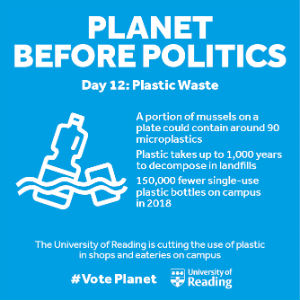#VotePlanet: Plastic waste reduction requires ‘changing bad habits’
30 November 2019

The University of Reading is taking a stand against single-use plastics by dramatically reducing their use on campus.
The number of single-use plastic bottles on campus was reduced by 150,000 in 2018, following the introduction of new drinks machines that use refillable bottles.
Plastic takes up to 1,000 years to decompose on landfill, yet many disposable items are still made from plastic. There are many alternatives available, and the university is actively seeking to switch to these as well as ensure what plastic is used on campus can be recycled rather than wasted.
Matt Tebbit, head of catering and bars at the University of Reading, said: “As the University-owned catering provider on campus we have been keen to support the University's ambitions around academic research and teaching by working to drive change in our operations and beyond in the wider hospitality industry.
“Our approach in finding and implementing solutions that make long-term changes, such as the Sustain It bottle scheme, are driven by partnering with organisations around the world that share our ambition.
“We believe that offering viable alternatives and having open, honest and sometimes difficult discussions with all parts of the University community is the key, as often there are conflicting views on the best way forward. The world has developed bad habits with disposable plastics and these must be changed for the good of the environment.”
In recent years on campus, plastic straws have been replaced with compostable bamboo, sandwiches made on campus are sold in compostable packaging, arrangements have been made to ensure the plastic lining on coffee cups sold in University cafes can be removed and recycled, and additional recycling stations have been added in all eateries. There has also been a drive in encouraging staff and students to use reusable coffee cups.
Two refillables stations on campus mean staff and students can buy things like oats, rice, pasta, washing up liquid and even milk in reusable containers.
Research at Reading is also highlighting the damage plastic pollution is doing to the environment. A study led by Professor Amanda Callaghan found that microplastics in water can be ingested by mosquito larvae and remain inside the flying insect after metamorphosis, where they can enter the food chain after being eaten by birds.
#VotePlanet
The University of Reading’s #VotePlanet campaign is highlighting the biggest threats facing the UK and global environment, as well as how research and action can combat them, in the lead up to the General Election on December 12.
Public concern for the environment has increased significantly in recent years, with political parties unveiling various eco-friendly pledges in their election manifestos.
The #VotePlanet campaign therefore aims to inform voters on the science behind these issues, and what sustainability action it is taking as an institution.
Follow the campaign on Twitter, Facebook and Instagram, and on the University news page. Get involved and share your examples of sustainable action using the hashtag #VotePlanet.
